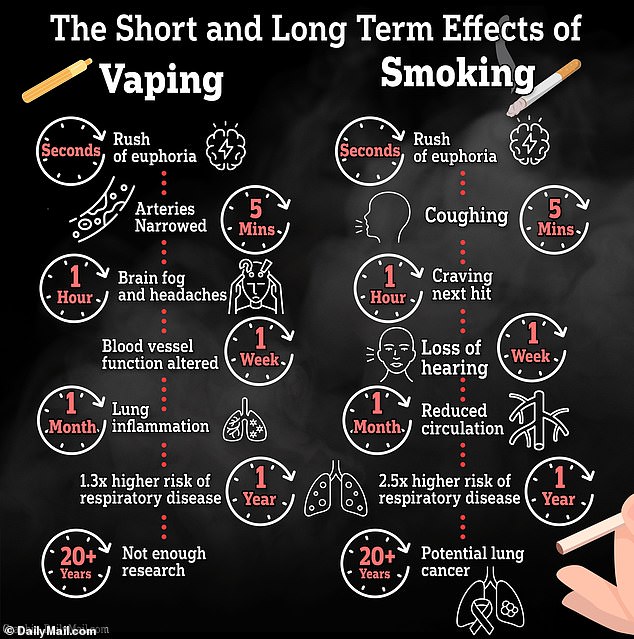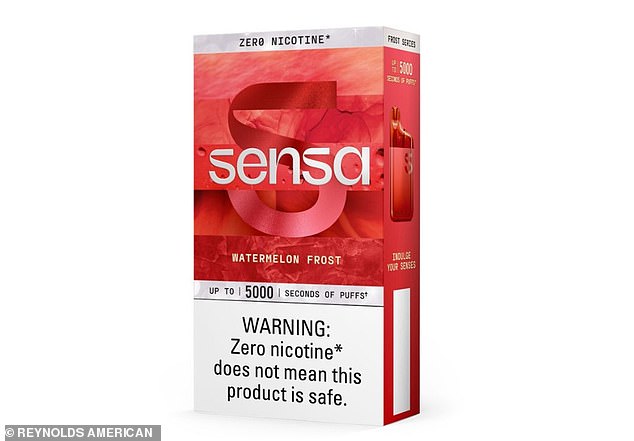The maker of some of the world’s most popular tobacco and cigarette products has launched a nicotine-free vape amid criticism of the industry for marketing dangerous products to minors.
Reynolds American, maker of Newport and Camel cigarettes and the now-banned Vuse e-cigarettes, announced it will begin selling a nicotine-free product aimed at adults.
The vape, called Sensa, goes on sale in the US this week for $20 and comes in six flavours, including frozen watermelon, frozen passionfruit and berry fusion.
And while it may be less addictive due to the lack of nicotine, health complications such as lung disease and blood vessel damage that vaping causes can still come from the ingredients they use and the vapor they produce.
Most e-cigarette vapours contain toxic chemicals, such as propylene glycol and glycerol, which when heated break down into formaldehyde, a carcinogen.
The vape, called Sensa, goes on sale in the United States this week for $20 and comes in six flavors.

With its new product, Reynolds American now joins other e-cigarette manufacturers in the nicotine-free vaping market.
With its new product, which the company compared to non-alcoholic beer or decaffeinated coffee, Reynolds American now joins the ranks of other e-cigarette manufacturers in the nicotine-free vaping market, such as Elf Bar, Sofi vape and Geek Vape.
Sensa will have up to 5,000 seconds of draw time and a removable battery that can be recycled. Normally, nicotine-free vapes cost between $13 and $17.
Announcing its new product, Reynolds American said the brand’s goal was to provide adults with a product for when they want to vape but don’t want to consume nicotine.
He also pledged to “set the highest standards in the industry.”
The vaping industry has been criticized for its marketing practices, which public health experts say target young people with their colorful packaging and candy-like flavors.
But Reynolds said Sensa, intended only for adults 21 and older, will not sell flavors that appeal to minors, will use a blocking feature to prevent unwanted use, will only feature models over 35 in marketing and will advertise on age-restricted social media sites.
The devices, the company said, will be displayed in stores between restricted sections featuring vaporizers and traditional cigarettes.
The brand will also carry the warning: ‘Zero nicotine does not mean this product is safe.’
Shay Mustafa, senior vice president of commercial communications and sustainability at Reynolds, said The Wall Street Journal: “We don’t want our products in the hands of young people, period.”
“For us, it’s not a grey area. It’s very clear: we want to be responsible.”
However, there are still concerns about whether Sensa will appeal to some people, drawn by its fruity flavours and seemingly safe “nicotine-free” label. There are also concerns that some stores may still sell the product to people under 21.

These vapes are not subject to oversight by the FDA, which only regulates e-cigarettes containing nicotine, and the agency has recently been tasked with trying to stem a tide of illegal devices from China flooding the U.S. market.
Companies seeking the FDA seal of approval must prove that their products are less harmful than traditional cigarettes and that their benefit in helping smokers quit tobacco outweighs the risk the products pose to underage Americans.
Reynolds said that because Sensa does not contain nicotine, he will not seek FDA approval for the product.
But despite claims that it is nicotine-free, the e-cigarette will still use a battery to heat the liquid in the device, producing vapour.
When the liquid is heated, toxic chemicals are formed that users inhale, regardless of whether the product contains nicotine or not.
These chemicals can include propylene glycol, used to make things like antifreeze and paint thinner; acrolein, an herbicide used to kill weeds; nickel, tin, lead, benzene, found in car exhaust; formaldehyde; and diacetyl, a chemical that has been linked to the lung disease bronchiolitis, also called “popcorn lung.”
Studies have linked these chemicals to a wide variety of health problems, including collapsed lungs, lung disease, cardiovascular disease, asthma, COPD and cancer.
In a first-of-its-kind study, researchers analyzed health data from 4.3 million former smokers and found that those who switched to vaping were twice as likely to die from lung cancer as those who quit cold turkey.
Other study Published in the journal Microvascular Research in January 2024, nicotine-free vaping liquid was identified to increase a specific protein in the lung, leading to organ stress, inflammation, and blood vessel rupture.
Study lead author Dr Havovi Chichger, Associate Professor of Biomedical Sciences at Anglia Ruskin University, said: ‘Nicotine-free vaping liquid has been shown to have the same chemical composition as nicotine-containing liquid, except for the absence of nicotine.
‘As the market is currently poorly regulated, it has been difficult to judge which chemical might be most damaging to vascular function.
‘Our findings indicate that exposure to nicotine-free vaping liquid elicits similar pro-oxidant and pro-inflammatory effects in human microvascular endothelial cells, and that ARF6 is a key regulator of vaping-induced damage to blood vessels.’
Sensa’s ingredients have not been made public, but Reynolds said she will include them on her website soon.
Dr Gavin Nye, professor of anatomy at the University of Chester in the UK, previously told MailOnline: “In the past, it has always been strongly suggested that vaping is not carcinogenic, unlike smoking tobacco, but now it seems evidence is finally coming to light that toxins in vapes may be linked to cancer.”
Substances in vapour can also enter the blood and damage blood vessels, potentially increasing the risk of a range of diseases, from dementia to heart disease.
And a recent study in the UK found that nicotine-free vapes can contain as much nicotine as a full-strength e-cigarette after examining more than 50 brands sold in the country.


